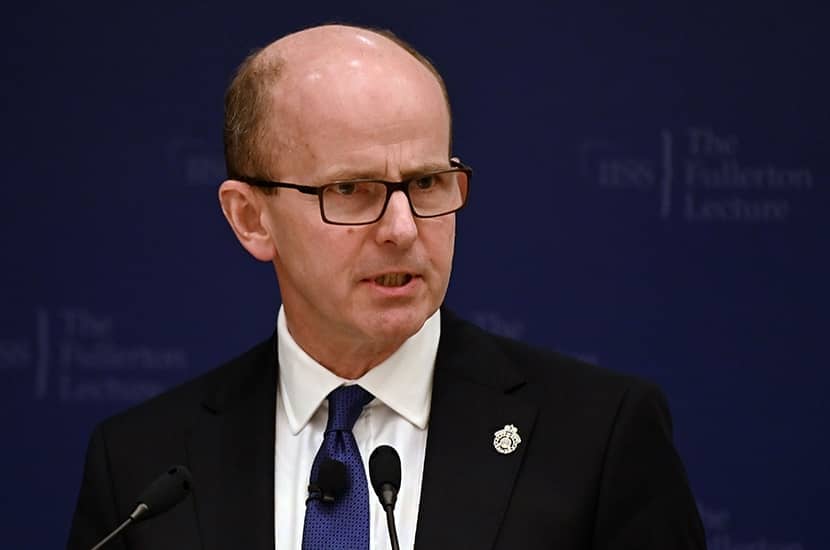Now that events in Ukraine are restoring a sense of proportion about the difference between aggressive autocracies and free countries, it seems almost incredible that, only last year, sporting teams etc were all but compelled to ‘take the knee’ in deference to Black Lives Matter. One official prominent in this obeisance (metaphorical not literal in his case) was Sir Stephen Lovegrove. As Permanent Secretary at the Ministry of Defence, he emailed staff in the wake of George Floyd’s murder in May 2020, using the BLM hashtag, and castigating the racism of his own department. When challenged about creating this official link with a hard-left organisation with borderline racist views against whites, Sir Stephen defended himself, saying his was ‘Not a political position whatsoever. It’s not a gesture of support for any particular organisation’. In 2021, Sir Stephen was promoted to the post of National Security Adviser, an appointment which caused some dismay in the world of defence and security. Even in that capacity, he put out a document telling employees of MI6 and MI5 to check their ‘white privilege’ (he is, needless to say, white). These are strange preoccupations for someone charged with co-ordinating our opposition to Vladimir Putin. Some accuse him of being half-hearted about helping Ukraine win.
Partly, perhaps, because of this sense that the main government adviser on security has his thoughts elsewhere, there is a growing tendency for other officials to make public speeches. Last week, Sir Jeremy Fleming, head of GCHQ, spoke in Australia, showing a bit of ankle by implying that intercepted comms had revealed that Putin’s advisers did not dare tell him the bad news about the war in Ukraine. Sir Jeremy went on to speak about the new ‘global security architecture’ (of which the new Aukus pact is a part), and how it is based on ‘our values’ which ‘have made our systems and democracies so successful’. In this, he was advancing the agenda of the government’s Integrated Defence Review; but it is an unintended consequence of our greater openness about formerly secret services that their chiefs have now become political players. Sir Jeremy’s speech could have been that of a foreign or defence secretary: it went well beyond his professional work at Cheltenham. Is this welcome? It is certainly good (though not without its problems) that US and UK intelligence about Putin’s plans has been so quickly deployed in public. It has helped prevent Russia setting the pace. But it is probably not so good that the once unseen and unheard servants of the state have become central to policy and its public exposition. They are at their best when their role, though immensely important, is limited. If you want to see the danger of a state where security services achieve political power, look at Putin’s Russia.
It is always amusing to hear the left invoking Margaret Thatcher. This week, they are doing so to prevent the privatisation of Channel 4, citing the fact that she brought the channel into being. She did, in 1982; but in her memoirs she explains that by 1988, when she was striving for the phasing out of the BBC television licence fee, she decided that Channel 4 would be better off privatised. On both subjects, she was defeated by what she calls ‘the monopolistic grip of the broadcasting establishment’. That grip is scarcely looser today.
For my two-part BBC documentary on the relationship between Mrs Thatcher and Ronald Reagan (Part 2 shows on BBC2 at 9 p.m. on Sunday), I was told that I would have to undergo the BBC’s new impartiality training. I was keenly looking forward to this, wondering how the BBC teaches impartiality and whether I would pass. But when the programme’s transmission was brought forward because of the Ukraine ‘peg’, there was no time for a training session. I had to make do with a short, polite talk about how I must not, in publicising the show, relate it to the May local elections. I won’t, I promise.
In the programme, I highlight how, during the Falklands war, Mrs Thatcher had been able to move President Reagan from would-be mediator to active supporter. I did not have space to mention the help of the Queen in this endeavour, so I am pleased that Robert Hardman, in his new book, Queen of Our Times, brings this out. Reagan was coming to Europe for a summit at Versailles, but it was the chance to ride with the Queen in Windsor Great Park for which he longed. As the day approached, his fear that Falklands differences might jeopardise this treat may have shifted his stance. ‘I need hardly say that the only absolutely stable and central item… is this riding event,’ cabled Nico Henderson, our ambassador in Washington. Older readers may remember the scene on television – the Queen head-scarfed on her beloved Burmese, the President bareheaded and tieless; he chatting easily with the press, she holding back at some distance, clearly anxious to ride off. When I visited the private quarters of the Reagan Library in Simi Valley, quite often used by the President in retirement, I was interested to see the ride glamorously portrayed in a vast oil painting. Indeed, almost all the non-American pictures there are of British people and scenes. Despite becoming famous as a man of the West Coast, Reagan usually rode not western-style, but with an English saddle. He had few connections in Britain, unlike most WASPs, yet there was something about its Queen and its then PM which captured his romantic imagination.
Attention is rightly being paid to the millions who, faced with atrocious energy costs, confront the option of ‘heating or eating’. Naturally the sufferings of the landed classes are less reported, but people who live in large old country houses are also affected disproportionately by rising gas, oil and electricity prices. They complain the choice is now between heating or Eton.







Comments